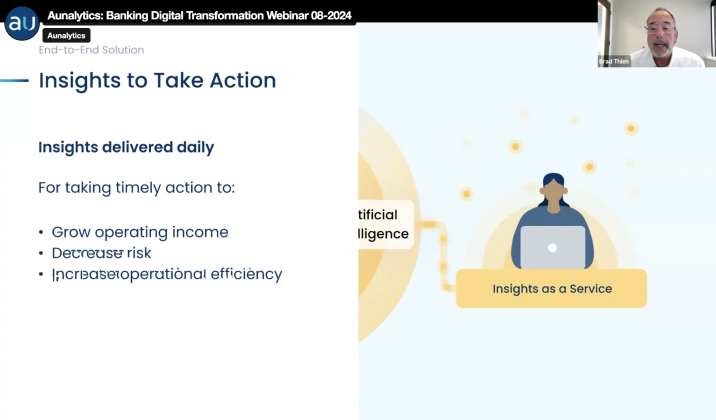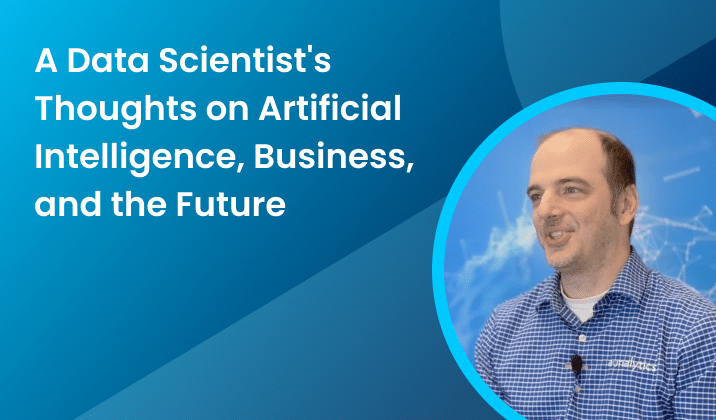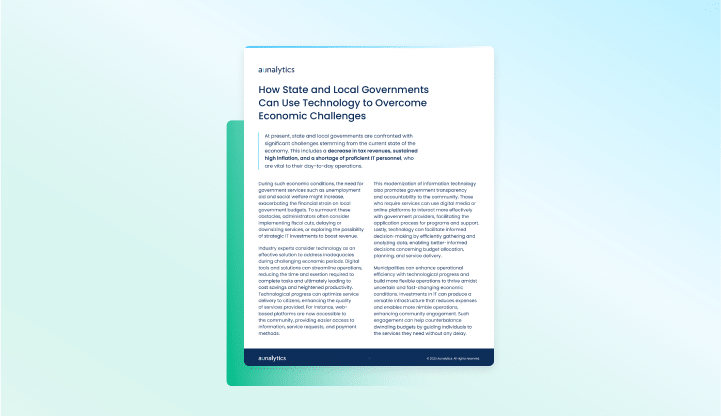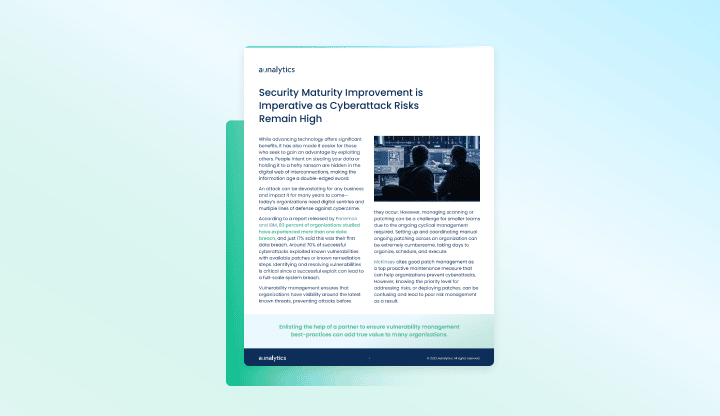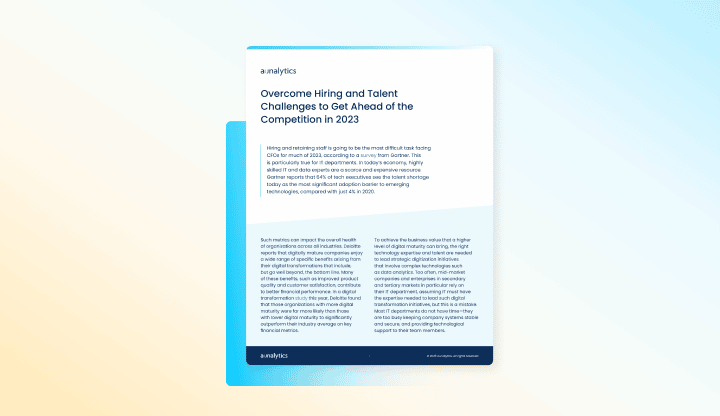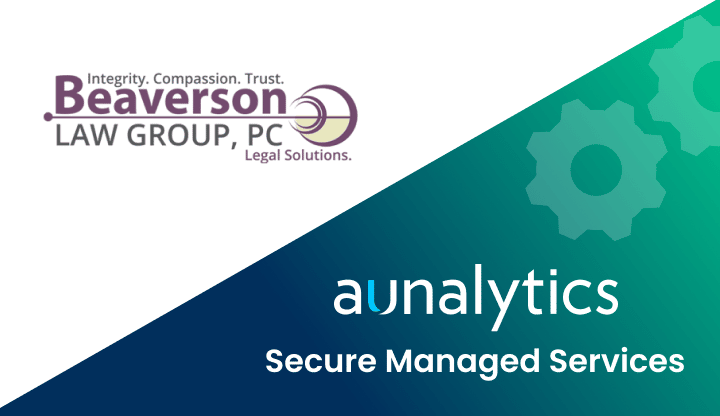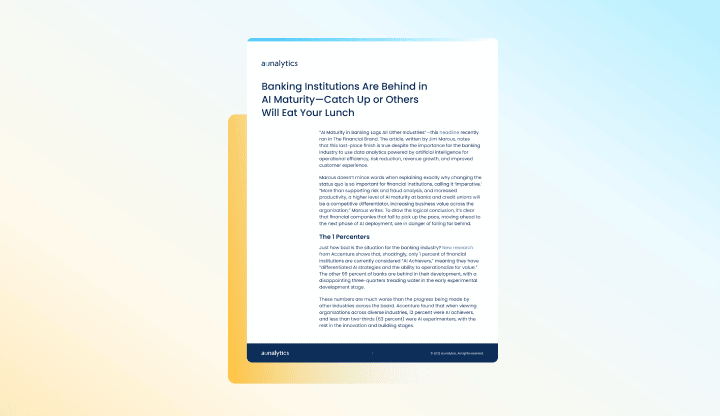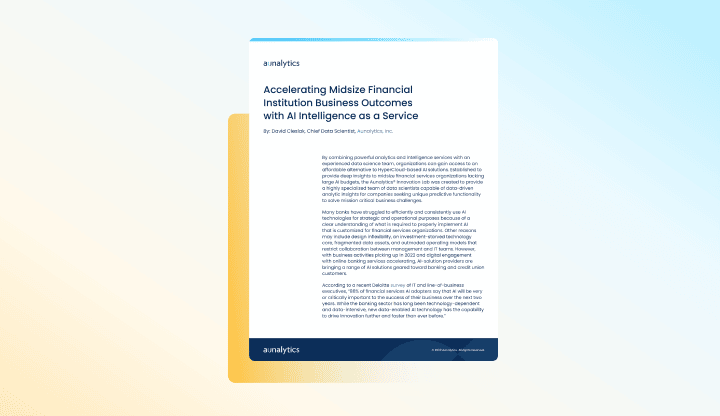Cybersecurity Controls Checklist
Cybersecurity Controls Checklist
Cybersecurity standards are constantly evolving as cyberattacks get increasingly complex. The following checklist from the Center for Internet Security (CIS) will allow your organization to evaluate whether the correct controls and safeguards are in place to meet global cybersecurity standards.
Digital Transformation in Community Banking Webinar
Digital Transformation in Community Banking
With the help of AI technologies, community banks have successfully been able to strengthen relationships, reduce churn, increase deposits, and improve ROI enterprise-wide by utilizing the data they already have at their fingertips—and your organization can, too. However, successful digital transformation can be a major challenge for midsized and community-based banks. Adopting new technologies, shifting operational mindsets, and hiring the talent necessary to build and execute upon AI solutions is a major endeavor. Many banks do not even know where to begin. In this presentation, discuss the steps and considerations for aggregating data across your bank to create a 360-degree view of your customers, why that is important, and ways other community banks have found success through analytics initiatives.
Study Reveals that Aunalytics Banking and Credit Union Clients Achieve Nearly 400% ROI Opportunity in One Year
Study Reveals that Aunalytics Banking and Credit Union Clients Achieve Nearly 400% ROI Opportunity in One Year
The Aunalytics Daybreak™ for Financial Services data analytics solution provides customer intelligence to financial institutions. It delivers insights-as-a-service, including AI-powered predictive analytics models that can be applied to transactional data for fresh insights delivered daily. Early study results reveal that using Daybreak, Aunalytics’ clients achieved nearly 400% ROI in one year to grow new business from existing customers.
A Data Scientist's Thoughts on Artificial Intelligence, Business, and the Future
A Data Scientist's Thoughts on Artificial Intelligence, Business, and the Future
In this interview, David Cieslak, PhD, the Chief Data Scientist at Aunalytics, describes complex analytics concepts such as artificial intelligence, machine learning, and deep learning, and explains how they are useful for businesses today—and will continue to be in the future. David has been with Aunalytics since its inception and leads its Innovation Lab in the development and delivery of complex algorithms designed to solve business problems in the manufacturing/supply chain, financial, healthcare, and media sectors.
How State and Local Governments Can Use Technology to Overcome Economic Challenges
How State and Local Governments Can Use Technology to Overcome Economic Challenges
At present, state and local governments are confronted with significant challenges stemming from the current state of the economy. This includes a decrease in tax revenues, sustained high inflation, and a shortage of proficient IT personnel, who are vital to their day-to-day operations. Industry experts consider technology as an effective solution to address inadequacies during challenging economic periods.
Security Maturity Improvement is Imperative as Cyberattack Risks Remain High
Security Maturity Improvement is Imperative as Cyberattack Risks Remain High
While advancing technology offers significant benefits, it has also made it easier for those who seek to gain an advantage by exploiting others. An attack can be devastating for any business and impact it for many years to come—today’s organizations need to move toward security maturity by utilizing multiple lines of defense against cybercrime.
Overcome Hiring and Talent Challenges to Get Ahead of the Competition in 2023
Overcome Hiring and Talent Challenges to Get Ahead of the Competition in 2023
Hiring and retaining staff is going to be the most difficult task facing CFOs for much of 2023. This is particularly true for IT departments. In today’s economy, highly skilled IT and data experts are a scarce and expensive resource. The mid-market organization requires another option that provides access to the right tools, resources, and support.
Beaverson Law Group, PC Strengthens Cyber Defenses with Aunalytics Secure Managed Services - PDF
Beaverson Law Group, PC Strengthens Cyber Defenses with Aunalytics Secure Managed Services
Banking Institutions Are Behind in AI Maturity—Catch Up or Others Will Eat Your Lunch
Banking Institutions Are Behind in AI Maturity—Catch Up or Others Will Eat Your Lunch
Financial institutions must embrace the use of data analytics powered by artificial intelligence for operational efficiency, risk reduction, revenue growth, and improved customer experience. Yet, it’s clear that financial companies that fail to pick up the pace, moving ahead to the next phase of AI deployment, are in danger of falling far behind. Luckily, there is a clear-cut solution to reaching AI maturity and achieving sustained, long-term success.
Accelerating Midsize Financial Institution Business Outcomes with AI Intelligence as a Service
Accelerating Midsize Financial Institution Business Outcomes with AI Intelligence as a Service
Many financial institutions have struggled to efficiently and consistently use AI technologies for strategic and operational purposes. To meet this need, the Aunalytics® Innovation Lab was established to provide deep insights to midsize financial services organizations lacking large AI budgets. This combination of powerful analytics and intelligence services with an experienced data science team allows organizations to gain access to an affordable alternative to HyperCloud-based AI solutions.




